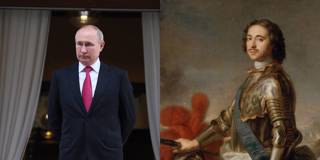Russian Czar Peter the Great not only sought more power and territory, but also wanted his country to become more advanced and progressive. President Vladimir Putin is achieving the opposite of his idol by isolating Russia and reducing it to a pariah state.
RIGA – Russian President Vladimir Putin’s brutal aggression against Ukraine is explainable only as an attempt to fulfill an imperialist fantasy – namely, of celebrating the 350th anniversary of Peter the Great’s birth by emulating the czar’s territorial conquests. But Peter did not become “Great” through military success alone. He also introduced modernizing reforms and built St. Petersburg, “a window to Europe” on the shores of the Baltic Sea.

RIGA – Russian President Vladimir Putin’s brutal aggression against Ukraine is explainable only as an attempt to fulfill an imperialist fantasy – namely, of celebrating the 350th anniversary of Peter the Great’s birth by emulating the czar’s territorial conquests. But Peter did not become “Great” through military success alone. He also introduced modernizing reforms and built St. Petersburg, “a window to Europe” on the shores of the Baltic Sea.